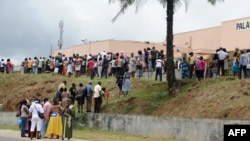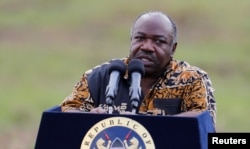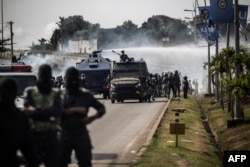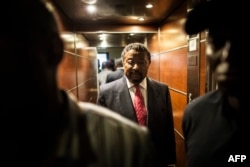Gabonese President Ali Bongo, who has been accused by opposition politicians of voter fraud, resisted calls Wednesday for a recount of votes cast in the country’s presidential election, saying he has no power to order one.
European Union observers in Gabon have said there was an "obvious anomaly" in election results that showed Bongo narrowly defeating challenger Jean Ping.
The EU observer mission to Gabon is questioning results from Upper Ogooue province, a Bongo stronghold where the incumbent president officially won 95 percent of the votes amid 99 percent voter turnout. The opposition has said the vote tallies in the province were vastly inflated.
In a statement Tuesday, the EU mission noted that turnout was significantly lower in Gabon's eight other provinces, averaging just 48 percent nationwide.
"An analysis of the number of non-voters and blank and spoiled ballots reveals an obvious anomaly in the final results of Upper Ogooue," it said. "...the integrity of the provisional results in this province is consequently compromised."
The mission chief reiterated a call for Gabonese authorities to publish the results from all polling stations around the country.
Earlier Tuesday, French Prime Minister Manuel Valls said Gabon should hold a recount of the vote after the opposition alleged that voter fraud took place.
"There are arguments and some doubts. European observers in the country have already made criticisms on the basis of objectives. It would be wise to do a recount," Valls told French radio station RTL.
Bongo, however told RTL radio the Constitutional Court must order a vote recount and he has no authority to initiate one.
"What people should be asking me to do is apply the law," he said. "I cannot violate the law. As far as a recount is concerned ... that's done at the level of the Constitutional Court."
Bongo went on to accuse the EU poll observers of bias and said the team should look into "some anomalies in the fiefdom of Mr. Ping."
"If we're raising anomalies, we have to be clear, balanced and raise all the anomalies that have been noted," Bongo said.
Gabon's election commission announced last week that President Ali Bongo won the election over opposition leader Jean Ping by about 5,000 votes, leading to protests and street violence that has left at least six people dead.
Gabon's Justice Minister Seraphin Moundounga resigned over the disputed re-election of Bongo, becoming the first high-level government official to step down since the vote.
Moundounga told Radio France International Monday that the government is not responding to concerns about the need for peace, leading him to decide to step down.
Also Monday, Ping, who also has declared himself the leader of Gabon, called for a general strike, saying an economic blockage would pressure the government.
However, few people seemed to stay home Monday, as many banks and shops in the capital, Libreville, re-opened following the violence. Some city residents said they did not hear about the call for a strike.
Ping said his campaign has evidence of election rigging, which he says he will present to Gabon's constitutional court.
In another development Monday, France expressed concern about the safety of several of its nationals, noting that "some arrests have been made in recent days."
Interior Minister Pacome Moubelet Boubeya said more than 1,000 people have been arrested nationwide, including as many as 800 in the capital. He confirmed three deaths in the post-election violence.
United Nations Secretary-General Ban Ki-moon spoke over the phone Sunday with Bongo and Ping and urged an end to the violence.
"The secretary-general deplored the loss of life that occurred during the demonstrations in the aftermath of the presidential election. He expressed concern about the continuing inflammatory messages being disseminated and called for an immediate end to all acts of violence in the country," according to a statement from Ban’s office.
The U.N. chief also requested that his Special Representative for Central Africa Abdoulaye Bathily continue to work with the parties in order to defuse tensions.
"Ban Ki-moon reiterated his call to President Bongo to impress upon the government the need to show restraint. He also urged Ping to issue a clear message to his followers, calling on them to refrain from any acts of violence in the interest of the country and of national unity," the statement read.
According to reports, 27 people who were detained from Ping’s campaign headquarters have been released.
Ban Ki-moon, however, stressed the importance of peaceful and legal means to seek a resolution in the outcome of the presidential election.








